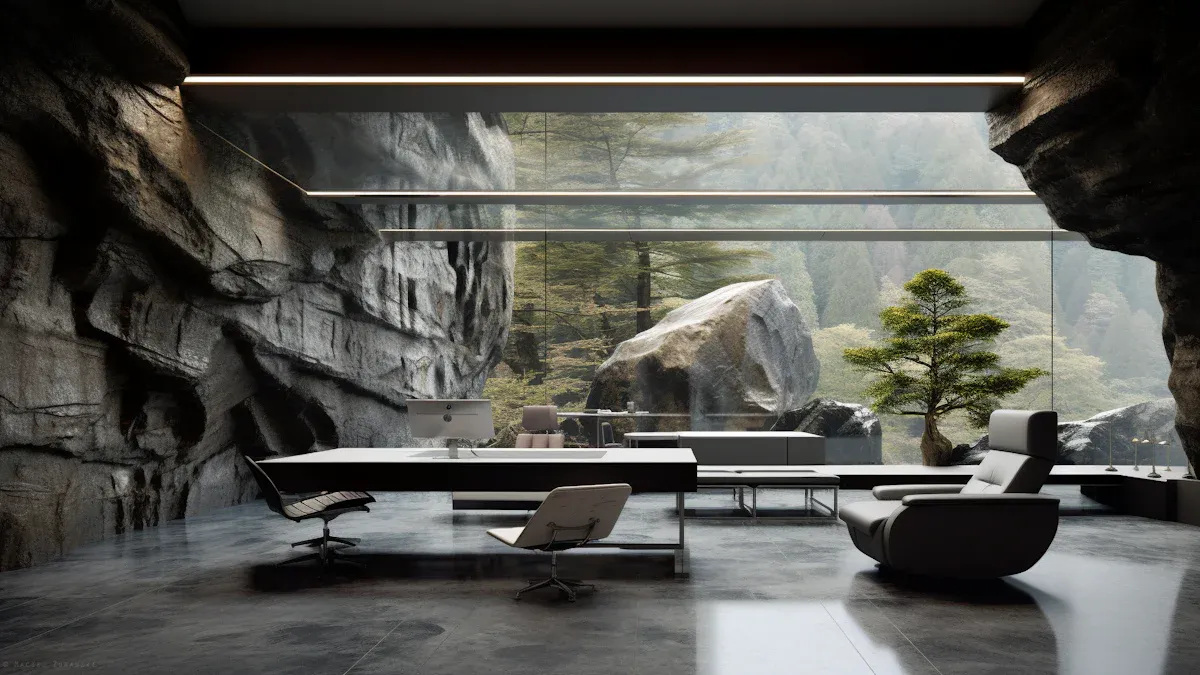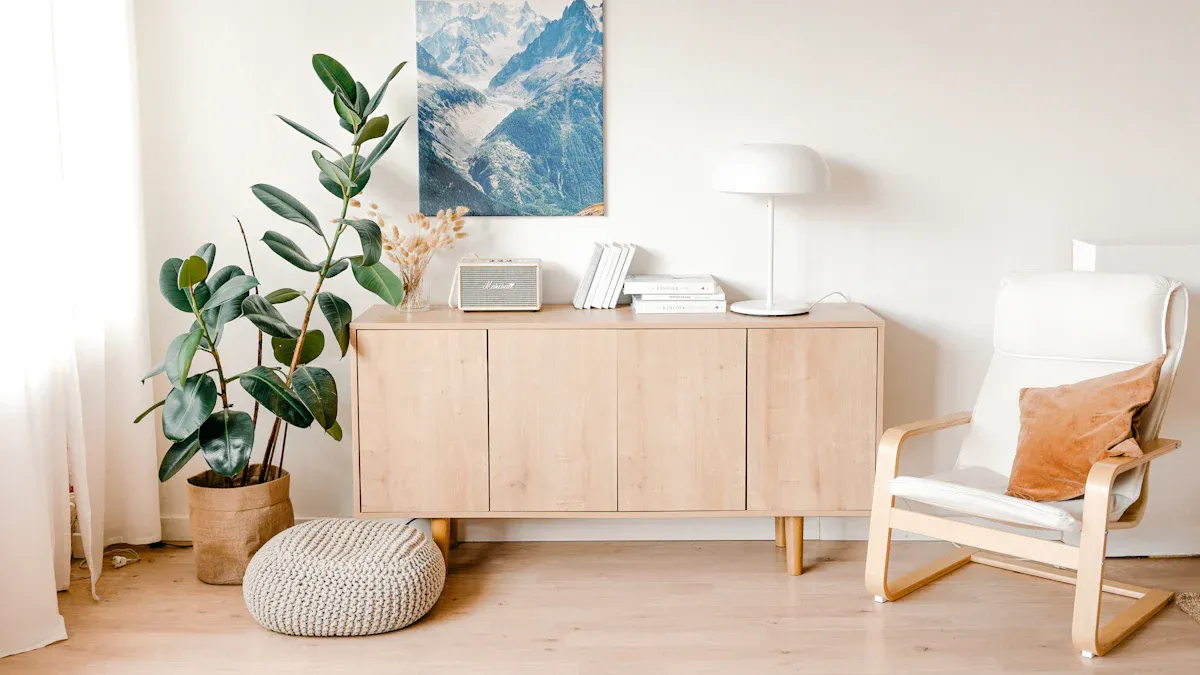
You can make your home feel peaceful with property layout feng shui. Small changes in your rooms can bring good energy. These changes also help you feel better. Research shows that homes using feng shui make people feel happy and healthy. People also feel closer to others in these homes. It does not matter if you live in a house or an apartment. Property layout feng shui can help everyone. Many people say they feel less stress in feng shui spaces. They also feel more relaxed and safe. Look at the chart below to see how feng shui helps your life and home.
Key Takeaways
Clean up mess often so good energy can move. This helps you feel less stressed at home.
Make sure wood, fire, earth, metal, and water are in each room. This brings balance and helps you feel better.
Put important furniture like your bed and desk in the best spot. This helps you feel safe and pay attention. You will feel more in charge.
Use the Bagua map to match home areas with your life. Add energy where you need it most.
Keep your front door and yard neat, bright, and friendly. This brings good energy and makes your home peaceful.
Property Layout Feng Shui Basics

What Is Feng Shui?
Feng shui started in ancient China over 6,000 years ago. People wanted to live in harmony with nature and their surroundings. At first, feng shui focused on picking the best land for homes and cities. Over time, it grew to include how you arrange rooms and furniture inside your home. Today, property layout feng shui helps you create space that supports your well-being and happiness. You use feng shui principles to guide the way you set up your home, so you get a good flow of energy and feel more balanced.
Did you know? The Forbidden City in Beijing was designed using feng shui principles to bring good fortune and strong Qi to the emperor.
Core Feng Shui Principles
You can use basic principles of feng shui to make your home feel better. The main goal is to let Qi, or energy, move smoothly through your space. When you have a good flow, you feel calm and focused. Here are some key ideas:
Natural light: Sunlight brings positive energy flow and lifts your mood. Open curtains and use mirrors to spread light.
Air flow: Fresh air helps Qi move. Open windows or use fans to keep air moving.
Five elements: Wood, Fire, Earth, Metal, and Water each support different parts of your life. Place them in the right spots to create balance. (Learn more about the elements in What Are the Five Elements in Feng Shui and What Do They Mean.)
Bagua map: This tool shows you how to use bagua map to match areas of your home with parts of your life, like health or career. (For more on using this tool effectively, see Bagua Feng Shui Map explained for easy home energy)
Commanding position: Put your bed or desk where you can see the door, but not in line with it. This gives you control and invites good chi energy.
A simple table can help you remember the five elements:
Element |
Area of Life |
Example Item |
|---|---|---|
Wood |
Family |
Plants |
Fire |
Fame |
Candles |
Earth |
Health |
Pottery |
Metal |
Creativity |
Metal frames |
Water |
Career |
Fountain, mirror |
The Role of Decluttering
A clutter-free space is the first step to better energy flow. Clutter blocks Qi and makes you feel tired or stressed. Studies show that too much clutter can raise your stress and lower your well-being. When you clear out things you do not need, you create space for positive energy flow. You also help your mind feel calm and ready for new things. Start small—clean one drawer or shelf. Each step makes your home feel lighter and your energy stronger. Natural light and fresh air work even better in a clean space, boosting your well-being and happiness.
Applying Feng Shui Principles
Using the Bagua Map
You can start applying feng shui principles by learning how to use the Bagua map. This map divides your home into nine zones, each linked to a part of your life, like health, wealth, or relationships. Here’s a simple way to overlay the Bagua map:
Draw your home’s floor plan from above and mark the front door.
Place the Bagua map so the bottom edge lines up with your front entrance.
Each section now shows which area of your life it connects to.
Notice any missing or extra spaces. These can affect energy flow and balance.
For odd-shaped homes, you may need to adjust the map or ask a feng shui expert for help.
Once you know each area, you can use colors and elements to boost energy flow and create a balanced living space.
Balancing the Five Elements
Feng shui principles say you need all five elements—wood, fire, earth, metal, and water—for a balanced living space. Each element brings its own energy:
Wood(木): growth and creativity (plants, green colors)
Fire(火): passion and excitement (candles, red)
Earth(土): stability and calm (clay pots, yellow)
Metal(金): clarity and focus (metal frames, white)
Water(水): peace and flow (fountains, blue)
Mix these elements in your rooms. For example, add a plant for wood and a small fountain for water. This balance keeps energy flow smooth and supports your well-being. (Learn more about the five elements in How to Use Feng Shui Crystals in Every Room of Your Home.)
Commanding Position
The commanding position is a key part of feng shui principles. Place your bed or desk so you can see the door, but don’t line up directly with it. Keep your back to a solid wall. This setup gives you a sense of control and safety. In the living room, put the sofa against a wall and make sure you can see who enters. The commanding position helps energy flow and makes you feel more secure and focused.
Tip: If you can’t put your furniture in the commanding position, use a sturdy piece behind you for support.
Floor Plan Shape and Orientation
Feng shui principles favor square or rectangular floor plans. These shapes help energy flow evenly and make your home feel safe. Irregular layouts can cause confusion and block energy flow. The entrance is also important. Try to have a clear, welcoming front door. The direction your home faces can affect your luck and happiness. Good design lets energy flow smoothly from the entrance to every room, making your home feel open and full of positive energy. Many people find successful applications of feng shui start with these simple steps.
Optimising Feng Shui in Key Areas

Entrance and First Impressions
The entrance is the first thing people see at your home. When you set it up well, you bring in good energy and new chances. Try these feng shui principles to make your entrance friendly and peaceful:
Keep the walkway to your door open. Take away shoes, boxes, and mess so Qi can move easily.
Make sure your front door works well. If it sticks, it can block energy and make you feel stuck.
Put a healthy plant by the door. Plants like ferns or money plants bring fresh energy and clean the air.
Use mirrors to bounce light and energy inside. Do not put a mirror right across from the door. This stops good energy from leaving.
Make your entrance bright. Good lights bring in positive energy and help your home feel safe.
Clean the entrance often. Dirt and dust can block energy and make you feel tired.
Add lucky things, like a bowl of coins, lucky bamboo, or a welcome mat with happy pictures.
Use colors and decorations for wood, fire, earth, metal, and water near your entrance.
Pay attention to small things. A clean mat, neat decorations, and healthy plants help make a good first impression.
Tip: Keep your front door clean, bright, and clear. This is one of the best feng shui decorating tips for bringing in good things.
Living Room Arrangement
The living room is where you spend time with family and friends. Feng shui principles help you set up this space for comfort and good energy. Here are some ways to feng shui your living room:
Put your chairs and sofa in a U shape or half circle. This makes it easy to talk and connect.
Do not push furniture right against the walls. Leave space behind and around each piece for energy to move.
Use a rug to hold the seating area together. Pick a coffee table with round edges to keep energy soft.
Keep paths between doors and furniture open. Blocked paths stop good energy and make the room feel small.
Use different lights. Try sunlight, ceiling lights, and lamps to set the mood and balance yin and yang.
Add plants like ferns or flowers to bring in wood energy and life.
Show all five elements in your decorations. For example, use a wooden table, a metal lamp, a water feature, pottery, and a candle.
Keep tables and shelves neat. Messy spaces block energy and can make you feel stressed.
Decorate with art and things that make you happy. This brings more good energy and comfort.
Remember: The rule of three works well in design. Put things in groups of three for a balanced look.
Bedroom Placement
You spend a lot of time in your bedroom, so it should help you rest and feel good. Use these feng shui principles for the best bedroom setup:
Put your bed in the commanding position. You should see the door from your bed, but not be right in front of it.
Use a strong headboard made of wood or soft fabric. This gives you support.
Place nightstands on both sides of the bed for balance.
Do not put your bed under beams, windows, or air units. These spots can make you feel uneasy and hurt your sleep.
Keep under your bed empty. If you must store things, use soft items and do not put too much.
Pick calm colors like soft green, blue, or cream. These colors help you relax and feel good.
Use only a few plants. Peace lilies or orchids are good, but do not fill the room.
Use soft lights and gentle fabrics to make the room cozy.
Do not have too many electronics in the bedroom. Too many devices can mess up your sleep and block good energy.
Keep your room clean and tidy. This helps energy move and lets you wake up feeling fresh.
Try this: Use pairs in your bedroom—two lamps, two pillows, two nightstands—to help with balance and harmony. (For tips on reducing clutter effectively, read "How to Arrange Your Bed for the Best Feng Shui Results.
Kitchen and Dining
The kitchen and dining room are the heart of your home. Feng shui principles here help with health, plenty, and family peace. Here are ways to feng shui your kitchen and dining room:
Put the dining room near the middle of your home, but not right by the front door. This keeps energy from leaving.
Do not put the dining table against a wall. Let energy move around it.
Use matching, steady chairs and set them so no one has their back to the kitchen door.
Keep the table clean and clear. Mess here can block good energy and hurt family peace.
Add plants like citrus trees or flowers for freshness and plenty.
Use mirrors to spread light and make the space feel bigger, but do not let them show mess or the stove.
Keep the kitchen neat and tidy. A clean kitchen helps you feel good and get things done.
Show all five elements with your colors and materials. For example, use wood cabinets, metal tools, earthy colors, and a small water feature.
Make sure kitchen doors open all the way. Doors that do not open well can block energy and make cooking hard.
Open windows for sunlight and fresh air. Good air helps you stay healthy and brings in good energy.
Feng shui decorating tips: Put a bowl of fruit or flowers on your table to show plenty and bring in good energy.
Bathroom and Home Office
Bathrooms and home offices need special care to stop energy loss and help you feel good and work well. Use these feng shui principles for smart setup and design:
Bathroom:
Keep the bathroom door shut to stop good energy and wealth from leaving.
Always close the toilet lid.
Fix leaks fast. Leaks mean energy and wealth are going away.
Put the toilet away from the bathroom door if you can.
Use earth things like stones or pottery to balance the strong water energy.
Add plants that like wet places, such as ferns or peace lilies, to soak up water and bad energy.
Make sure the bathroom is bright and has fresh air. This keeps energy healthy.
Use mirrors to show good spaces, but never show the toilet or drains.
Clean the bathroom often to keep energy fresh.
Home Office:
Feng shui your office by putting your desk in the command spot. You should see the door, but not sit right in front of it.
Do not face a wall or have your back to the door.
Keep your desk neat for clear energy and focus.
Use sunlight and good air to help your mood and work.
Add plants like bonsai or bamboo for growth and focus.
Pick colors that help your work—blue for calm, green for growth, yellow for focus, white for creativity.
Set up your office with spots for different jobs.
Decorate with things that inspire you, like awards or art.
Show all five elements with your decorations and colors.
Pro tip: Feng shui your office by adding a small water feature or a metal item to help with harmony and getting work done.
Outdoor Spaces
Outdoor areas are just as important as rooms inside. Feng shui principles help you make your yard, patio, or garden peaceful and full of good energy.
Use curved paths instead of straight ones. Curves help energy move gently and avoid sharp movement.
Add plants with soft, round leaves. Do not use spiky plants, which can bring harsh energy.
Put water features like fountains or ponds in the north, east, or southeast. Moving water means wealth and calm.
Show all five elements by using trees (wood), red flowers (fire), rocks (earth), metal things, and water features.
Make shady spots for yin energy and sunny spots for yang energy. This balance helps you feel good and get things done.
Use natural borders like bushes instead of fences for a softer, more peaceful space.
Add main spots like a fire pit or sitting area to help people gather.
Keep paths and garden beds neat. This lets good energy move and makes your outdoor space feel open and friendly.
Use the Bagua map to help you put things in your garden. For example, put a birdbath in the north for water energy or a stone bench in the northeast for earth energy.
Plant Type |
Ideal Placement Area |
Feng Shui Role and Symbolism |
|---|---|---|
Bamboo |
Wealth corner (Southeast) or East |
Stands for strength, luck, and plenty; helps you grow. |
Money Plant |
Wealth corner (Southeast) |
Brings wealth and plenty; stands for money safety. |
Orchids |
Relationship area (Southwest) or Bedroom |
Means love, beauty, and grace; helps with romance and peace. |
Citrus Trees |
Kitchen or Dining area |
Stands for plenty, happiness, and health; brings freshness. |
Peace Lily |
Bedrooms or Meditation areas |
Brings calm and peace; great for relaxing. |
Ferns |
Living areas or near Entrances |
Stands for peace, new starts, and feeling fresh. |
Bonsai |
Study or work areas (offices) |
Means balance, patience, and focus. |
Flowering Plants |
Varies by color (e.g., pink for love, yellow for health) |
Adds life and helps with different parts of life. |
Add plants to every part of your property to help good energy move and make your space lively and healthy.
Improve Feng Shui: Common Mistakes
Clutter and Blocked Energy
Clutter is one of the biggest problems when you want to improve feng shui in your home. You might think a few extra things do not matter, but clutter blocks the flow of Qi and makes your space feel heavy. When doors cannot open all the way or you have piles of stuff in corners, energy cannot move. This blocked flow can make you feel tired, stressed, or even sad. Studies show clutter raises stress and lowers your focus. If you keep things you dislike or have too many knickknacks, you invite negative energy. Old photos and unruly cables also mess with the flow and make your home feel stuck in the past. (For tips on reducing clutter effectively, read How to Arrange Your Bed for the Best Feng Shui Results.)
Aspect |
Impact on You |
Details |
|---|---|---|
Blocked Qi flow |
Stress and tiredness |
Clutter stops energy from moving, making you feel heavy. |
Lower focus |
Hard to concentrate |
Messy spaces compete for your attention. |
Negative mood |
Sadness or worry |
Clutter links to depression and low energy. |
Tip: Start small. Clear one shelf or drawer. You will notice the flow of energy improve right away.
Poor Furniture Placement
Furniture placement can make or break the flow in your home. If you push your bed against a wall or place it where you cannot see the door, you lose the commanding position. This setup blocks Qi and makes you feel uneasy. Desks facing windows let energy flow out, so you lose focus. If you put a bench at the foot of your bed, you block career energy. Storing clutter under your bed also stops the flow and can hurt your sleep. Arranging all furniture against walls creates dead space and harms harmony. You want to balance the flow, not just make things look neat.
Place your bed so you can see the door, but do not line up with it.
Keep your desk away from windows and out of bedrooms.
Use furniture that fits the space, so energy can move easily.
Mix up your furniture placement to keep the flow balanced.
Remember: Good flow helps you feel safe, focused, and relaxed.
Ignoring Outdoor Areas
You might forget about your yard or garden, but outdoor spaces matter for feng shui. If you let plants die or get overgrown, you block sunlight and stop the flow of Qi into your home. Dirty water features or messy patios create stagnant energy. Outdoor areas are extensions of your living space. Curved paths and healthy plants help the flow move gently and bring in positive energy. If you ignore these areas, you risk letting negative energy build up around your home. This can make you feel stuck or even harm your well-being.
Keep plants healthy and trimmed.
Make sure water features are clean and moving.
Add seating areas to invite good flow and family gatherings.
Use curved paths to guide energy gently.
Outdoor spaces help the flow of Qi and support harmony inside your home.
You can boost your well-being by following feng shui steps in your home. Start with decluttering and balancing the five elements. Place furniture in command positions and use the Bagua map to guide your layout. Keep your space clean and let in natural light for better well-being. Add plants and soft lights to support well-being. Make sure your entryway feels welcoming and clear. Use mirrors wisely to reflect well-being. Choose colors and decor that lift your well-being. Try these tips and watch your well-being improve every day.
Tip: Begin with one room. Notice how your well-being changes as you make small adjustments.
Feng Shui Checklist for Well-Being:
Declutter often
Balance elements in each room
Keep entryways open
Use natural light
Add healthy plants
Place furniture for command
Clean windows
Choose colors for well-being
FAQ
How do I start using Feng Shui in my home?
Begin by clearing clutter. Open windows for fresh air. Let sunlight in. Place your furniture so you can see the door. Add healthy plants. Use the Bagua map to find key areas. Small changes make a big difference!
Can I use Feng Shui in a small apartment?
Yes! Feng Shui works in any space. Use mirrors to spread light. Keep pathways clear. Add plants for fresh Qi. Place your bed or desk in the commanding position. Focus on balance and comfort.
What are the five elements in Feng Shui?
The five elements are Wood, Fire, Earth, Metal, and Water. Each one brings a special energy. You can use colors, materials, and plants to show these elements in your rooms.
Element |
Color |
Example |
|---|---|---|
Wood |
Green |
Plants |
Fire |
Red |
Candles |
Earth |
Yellow |
Pottery |
Metal |
White |
Frames |
Water |
Blue |
Fountain |
How often should I declutter for good Feng Shui?
Try to declutter every month. Clean one area at a time. Keep entryways and main rooms clear. Regular cleaning helps Qi move and keeps your home feeling fresh.
Do I need a Feng Shui expert to get results?
You don’t need an expert to start. Follow simple tips like clearing clutter, using natural light, and balancing the five elements. If you want deeper changes, you can ask a Feng Shui consultant for help.
See Also
What Are the Five Elements in Feng Shui and What Do They Mean






